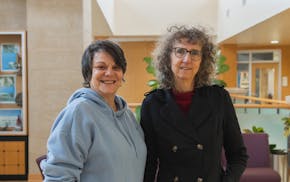It was a first-grade report card that made Brett Mortenson suspect he wasn't teaching his son, Grant, a few of the independent skills he needed to know. While Grant's classroom grades were good, the teacher commented that he "needed improvement" tying his shoes.
"That was a big moment for me because I really wasn't even aware of it," said Mortenson, who lives in Minneapolis. "I'd never bought him shoes with laces because the Velcro kind were just so much quicker and easier for me to fasten for him."
As a single parent, Mortenson said, he's becoming more conscious of the fact that he does a lot of tasks for Grant, now 9, that his son could — and should — do himself, such as simple chores around the house or pouring his own breakfast cereal. Their busy lifestyle frequently means that the two are always rushing to school, work or activities such as basketball and piano.
"I know I've just gotten into the pattern of doing things for Grant since it's easier for me, but I definitely also know I want to start giving him more responsibility," Mortenson said.
Giving kids that responsibility — and letting them accept the logical consequences of it — can be an important part of their personal development.
A recent article on overparenting, "Why Parents Need to Let Their Child Fail," on the Atlantic magazine website defined the word as "parents' misguided attempts to improve the child's current and future personal and academic success." It featured details of a survey by the Queensland University of Technology on the common missteps made by parents, based on questions prompted by teachers, guidance counselors and psychologists. The responses focused on everything from cutting up a 10-year-old's food, to coming to the rescue at school with a forgotten lunchbox or homework assignment, to not allowing a teenager to learn to drive.
Developmental psychologist Marti Erickson, local co-host and owner of the Mom Enough podcast and website with her daughter Erin, said that while parents might think it's fine to create such an airtight support net for their child, in the long run they aren't doing them any favors.
"I've heard from college professors about parents contacting them regarding their student's assignments," she said. "Parents have failed to do their job as parents if they feel like they need to do that."
Learning life skills
Children need to develop a sense of being able to master a variety of daily living skills so they will feel competent to navigate tough situations when the time comes, she said.
"Parents have a big responsibility during those early elementary years," Erickson said. "They have to work with their kids on things like time management and organizational skills. By the middle school years, kids should absolutely be responsible for what they need to do and accept the logical consequences if they don't."
As a single parent to Clara, 8, and McKinley, 6, Erin Erickson, maternal-child health specialist and co-host and owner of Mom Enough, said sometimes her instinct is to bail out her daughter or son if they have forgotten something at home that is needed for school, but more often than not she doesn't have enough flexibility in her own daily schedule to come to their rescue.
"If parents are making it too easy for kids not to be responsible, they aren't teaching them anything," Erin Erickson said. "My mom and I often talk about the fact that the goal of parenting is to essentially put yourself out of a job. I don't want to be the parent calling my kids to wake them up in the morning when they are in college."
Parents who think they are doing too much for their kids can start by making them more accountable, said Marti Erickson. If a child forgets a lunchbox at home, one "rescue" is fine, but coach them about remembering everything they need in the morning before heading out the door. The same goes for homework: Teach them the skills they need to organize their backpacks the night before.
While these may seem like small details, building age-appropriate competence at every stage of life will actually go a long way toward their transformation into the kinds of co-workers and spouses their parents should want them to be.
"There is a whole wealth of research showing that the key to becoming a happy and competent adult is connection, contribution and competence," Marti Erickson said. "Competence hits right on this issue of overparenting. Kids need that springboard toward the rest of their lives — they should know when to seek help and resources, but the real sense of mastery and competence comes from doing things well on their own."
Julie Pfitzinger is a West St. Paul freelance writer.
